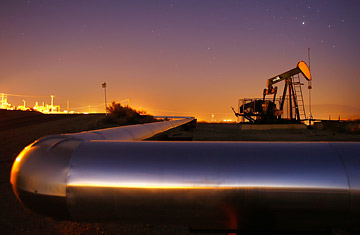
An oil rig in Taft, California.
The looming global energy crisis is unlikely to be on the agenda when the leaders of the world's major economic powers gather in Washington on Saturday for the Group of 20 summit: After all, they're scrambling to fix the world's financial system and soften the landing of the slowing world economy, and energy may seem a lot less urgent than the credit crisis — indeed, one silver lining of the global financial crisis has been a falloff in energy consumption and therefore, lower oil prices.
But the respite could be brief, according to the International Energy Agency's analysts. The Paris-based organization's annual World Energy Outlook, released on Wednesday, predicts that oil prices will start a steep climb soon, and by 2030 will settle around $120 a barrel — more than double this week's price — as producers face rocketing costs of equipment such as drills and rigs, and are forced into the increasingly expensive business of extracting oil from less accessible fields, many of them far out at sea. Added to that, the world economy continues to grow — albeit at a slower rate — which will likely accelerate again at some point in the coming years — prompting billions more people to drive cars and burn electricity at home during the next two decades, says the report by the IEA, which represents the industrialized oil-consuming countries. Securing sufficient energy supplies, and switching to low-carbon systems will require "radical action by governments."
The major oil companies remain hugely profitable and a popular target of politicians' ire, but their control over energy resources is dwindling, according to the IEA report — about 80% of new oil fields that come online during the next two decades will be entirely beyond their control. While big oil fields controlled by countries such as Britain and Norway are stagnating or dwindling, giant new fields in Russia, Kazakhstan and Saudi Arabia were recently brought online just as oil prices hit record highs, and that massive windfall for oil-rich governments has tilted the balance of power away from old-fashioned big oil. increasingly, powerful nationalist politicians treat oil reserves as national patrimony. Several countries have begun to renegotiate oil contracts with the major companies, in order to keep a greater share of revenues for themselves.
The long-term ripple effects of high oil prices could be far more serious than the $4-gallon prices that confronted American drivers last summer. As oil resources shift increasingly into government hands, there is less certainty that oil officials in various countries will reinvest the trillions of dollars needed to explore and develop new fields, and keep the world's oil flowing. "The immediate risk to supply is not one of global resources but rather a lack of investment where it is needed," says the IEA report. A fair portion of the world's proven oil reserves lie in countries with crippling poverty and deep social problems, including African countries such as Equatorial Guinea and Angola; Africa exports virtually all its oil and gas, and about three-quarters of African homes have no electricity. Such countries, warns the IEA, "lack the technology and skilled personnel to do much more than simply maintain existing producing assets."
Their declining grip on oil reserves may be one reason for companies such as ExxonMobil and Chevron investing heavily in developing alternative energy. Those investments could see a massive pay-off once governments are forced by a combination of energy prices and climate change to introduce robust alternative energy policies. The organization's analysts predict that governments will need to spend about $4.1 trillion on alternative energy development over the next two decades.
In order to curb carbon emissions, the IEA recommends cutting the approximately $310 billion a year in fuel subsidies provided to consumers in countries such as China, Iran and India, where cheap gas prices offer little incentive for drivers to switch to other transportation. But allowing the pump price to rise is no more politically palatable in those societies than it is in the U.S.
About 97% of the world's new carbon emissions will come from outside the United States and Europe, largely from China, India and the Middle East, who will consume about half the world's energy by the year 2030. Before global habits begin to change permanently, greenhouse gas output will keep rising, probably at least until 2020. By which time the financial crisis of 2008 might seem like ancient history.
